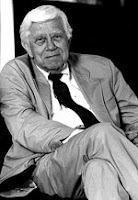We recently learned that the Southern Regional Council had received a bequest from the Estate of Elisabeth Larisey Kytle. We are grateful to Elisabeth Kytle and her late husband Calvin Kytle, whose lives serve to remind us that Southern progressivism has a long and distinguished history.
 Anna Belle Larisey. At age 13, she moved with her parents to Valdosta, Ga., and in 1935 she graduated from Georgia State Woman's College (now Valdosta State University). After graduating from college she took a position with the National Youth Administration, where she met Calvin Kytle, her future husband, an Emory graduate who later worked part time as a reporter for The Atlanta Journal Constitution. While Calvin was serving in World War II, Elisabeth took a position with the Citizen's Fact Finding Movement, and she also worked as a staff writer in the public relations department of the Bell Bomber Plant in Marietta, Ga.
Anna Belle Larisey. At age 13, she moved with her parents to Valdosta, Ga., and in 1935 she graduated from Georgia State Woman's College (now Valdosta State University). After graduating from college she took a position with the National Youth Administration, where she met Calvin Kytle, her future husband, an Emory graduate who later worked part time as a reporter for The Atlanta Journal Constitution. While Calvin was serving in World War II, Elisabeth took a position with the Citizen's Fact Finding Movement, and she also worked as a staff writer in the public relations department of the Bell Bomber Plant in Marietta, Ga.
Following the war, Mr. Kytle served briefly on the faculty of Emory University, and Mr. and Ms. Kytle became deeply involved in issues of civil rights. With a grant from the Rosenwald Fund, secretly adm inistered by the Southern Regional Council, Calvin collaborated with Congressman James A. Mackay on an in-depth study of Georgia’s 1947 Constitutional crisis (sometimes referred to as the "three governors" conflict), which set the stage for Georgia’s political transformation. This study included interviews with politicians, factory workers, civic leaders, academics and preachers throughout Georgia’s 159 counties, including editor Ralph McGill, novelist Lillian Smith, defeated gubernatorial candidate James V. Carmichael, and others. This study, reputedly suppressed by the Talmadge regime, was later published under the title Who Runs Georgia?
inistered by the Southern Regional Council, Calvin collaborated with Congressman James A. Mackay on an in-depth study of Georgia’s 1947 Constitutional crisis (sometimes referred to as the "three governors" conflict), which set the stage for Georgia’s political transformation. This study included interviews with politicians, factory workers, civic leaders, academics and preachers throughout Georgia’s 159 counties, including editor Ralph McGill, novelist Lillian Smith, defeated gubernatorial candidate James V. Carmichael, and others. This study, reputedly suppressed by the Talmadge regime, was later published under the title Who Runs Georgia?
The Kytles left Georgia in 1950, when Calvin took a position as an information officer for the Nationwide Insurance Company in Columbus, Ohio, and thereafter they lived in places as diverse as Cabin John, Md., Washington D.C. and Chapel Hill, N.C.
In 1958, Elizabeth Kytle published Willie Mae, a first-person account of a black woman's life and her exper iences as a domestic worker in a succession of southern households in the first half of the Twentieth Century. Hailed by The New York Times as one of the best books of 1958, Willie Mae is a testament to the courage and strength of a generation of women who struggled to survive with dignity and humanity in the years before the civil rights movement. On the occasion of the republication of Willie Mae thirty years later, a reviewer in Southern Changes noted that, in the tradition of Zora Neal Hurston, Elizabeth Kytle’s listening had “produced an early ad brilliant example of what is now called ‘oral history.’”
iences as a domestic worker in a succession of southern households in the first half of the Twentieth Century. Hailed by The New York Times as one of the best books of 1958, Willie Mae is a testament to the courage and strength of a generation of women who struggled to survive with dignity and humanity in the years before the civil rights movement. On the occasion of the republication of Willie Mae thirty years later, a reviewer in Southern Changes noted that, in the tradition of Zora Neal Hurston, Elizabeth Kytle’s listening had “produced an early ad brilliant example of what is now called ‘oral history.’”
Elisabeth’s other books include Four Cats Make One Pride, for which she also took the photographs; Home on the Canal, an informal history of the old Chesapeake & Ohio Canal, followed by reminiscences of eleven men and women who lived and worked on the boats, and Voices of Bobby Wilde, the story of a paranoid schizophrenic.
From 1964-1965, Calvin Kytle served as deputy director of the U.S. Community Relations Service, created under the Civil Rights Act of 1964. In 1978, he founded Seven Locks Press, where he published authors including Bill Moyers. He was the author of the young-adult book Gandhi, Soldier of Nonviolence, and the Depression-era novel, Like a Tree.






